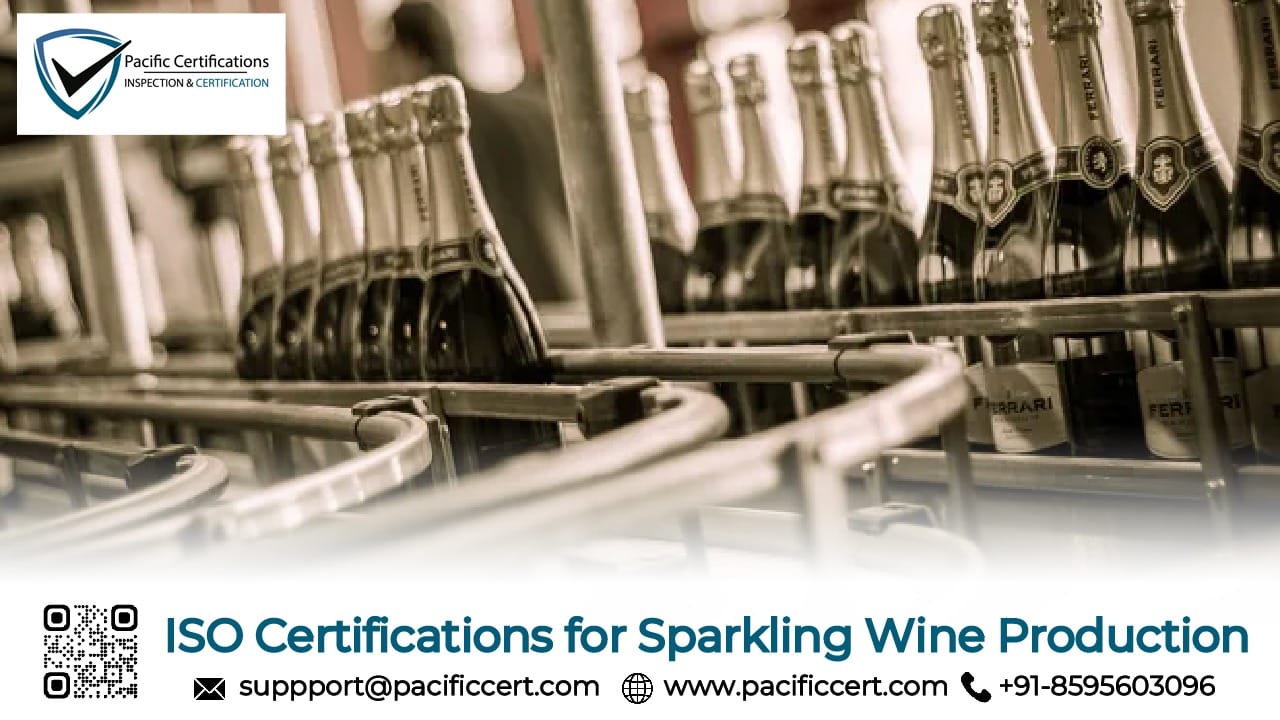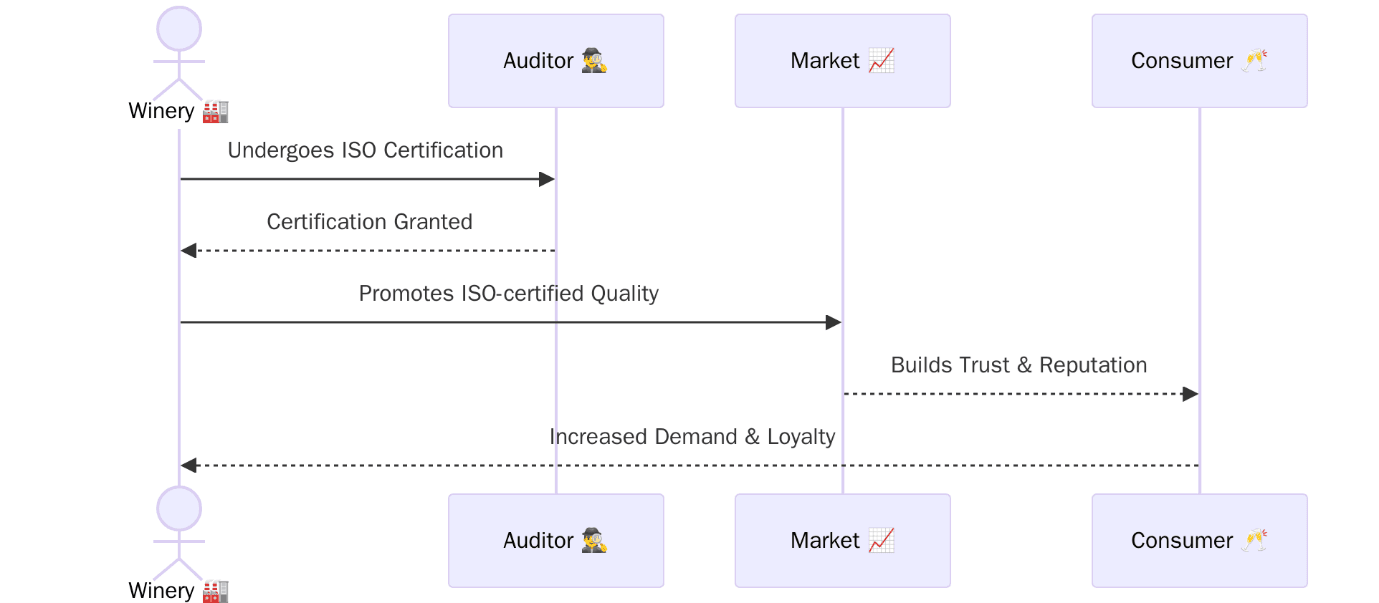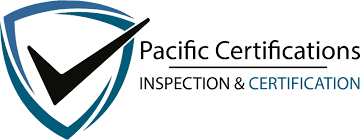ISO Certifications for Sparkling Wine Production Businesses, Requirements and Benefits

ISO Standards for Sparkling Wine Production
The global demand for sparkling wine has surged significantly, leading to a greater emphasis on quality control and food safety. This rising demand necessitates compliance to ISO certifications for sparkling wine production. These standards offer a universal framework, ensuring the wine-making process aligns with global safety and quality expectations.
ISO standards are recognized worldwide, these standards encompass every stage, from grape harvesting and fermentation to packaging and delivery, enhancing both product integrity and consumer trust.

Implementing ISO certifications helps wineries demonstrate a commitment to excellence, mitigate production risks, and open doors to international trade opportunities.
Looking to certify your sparkling wine production to ISO standards? Reach out to us at [email protected], call us at +91-8595603096.
Applicable ISO Standards for Sparkling Wine Production
Several ISO standards can be directly applied to different aspects of sparkling wine production. Here's a breakdown of the most relevant ones:
ISO 9001: Quality Management Systems
This is the most widely adopted standard. It focuses on customer satisfaction, continual improvement, and quality consistency. For sparkling wine producers, this standard ensures that every batch adheres to pre-defined quality benchmarks.
ISO 22000: Food Safety Management Systems
Given that sparkling wine is a consumable product, ISO 22000 is critical. It integrates the principles of Hazard Analysis and Critical Control Points (HACCP), ensuring food safety throughout the supply chain—from vineyard to bottle.
ISO 14001: Environmental Management Systems
Winemaking can impact the environment through water usage, waste generation, and energy consumption. ISO 14001 helps producers manage their environmental responsibilities effectively, promoting sustainable viticulture.
ISO 45001: Occupational Health and Safety
Safety in production facilities is essential. ISO 45001 addresses worker safety and helps minimize workplace risks, ensuring a safe environment for all employees.
ISO 17025: Testing and Calibration Laboratories
Sparkling wine producers often rely on laboratories for chemical testing. ISO 17025 ensures these labs are competent and deliver accurate, reliable results.
ISO 50001: Energy Management
Energy-intensive processes such as fermentation, refrigeration, and bottling are common in wine production. ISO 50001 aids in optimizing energy use, reducing costs and carbon footprints.
Click here to find out more applicable standards to your industry
At Pacific Certifications, we specialize in auditing and issuing ISO certifications. For wineries aiming to meet international compliance standards, our role begins once you are ready for certification. We ensure that your management systems are audited in accordance with ISO criteria and that certifications are issued without any conflict of interest.
Our objective, impartial audits help businesses validate their operational quality, food safety, and sustainability practices. While we do not provide consultancy or implementation services, we are a trusted name in certification issuance and compliance verification.
If you're looking to enhance your marketability and global footprint in sparkling wine production, our certification services are designed to support your goals with clarity and integrity.
Ready to expand into global wine markets with ISO certifications? Pacific Certifications is here to help. Email us at [email protected], call +91-8595603096, or visit www.pacificcert.com to begin your certification journey!
Requirements of ISO Certifications for Sparkling Wine Production
Below are the key requirements for each ISO standard relevant to sparkling wine production:

ISO 9001 – Quality Management Systems Requirements
- Define a Quality Policy & Objectives
- Documented procedures & processes
- Perform internal audits and management reviews
- Continual improvement through feedback and corrective actions
- Customer satisfaction focus
ISO 22000 – Food Safety Management Systems Requirements
- Conduct Hazard Analysis (HACCP)
- Identify Critical Control Points (CCPs)
- Establish food safety objectives and traceability
- Maintain PRPs (Prerequisite Programs) like hygiene & sanitation
- Emergency preparedness and communication procedures
ISO 14001 – Environmental Management Systems Requirements
- Identify and evaluate environmental aspects & impacts
- Set environmental objectives and targets
- Implement operational controls for sustainability
- Legal compliance evaluation and records
- Continuous monitoring and improvement of environmental performance
ISO 45001 – Occupational Health and Safety Requirements
- Hazard identification and risk assessment
- Implement control measures to eliminate or minimize risks
- Training and awareness programs for employees
- Monitor incidents and maintain safety performance records
- Legal and regulatory compliance on workplace safety
ISO 17025 – Testing and Calibration Laboratories Requirements
- Ensure technical competence of lab staff
- Calibrate instruments and equipment
- Establish and validate testing methods
- Maintain traceability of measurements
- Assure result accuracy, reliability, and impartiality
ISO 50001 – Energy Management Systems Requirements
- Develop an energy policy and management plan
- Analyze current energy usage (baseline)
- Set measurable energy goals and targets
- Monitor energy performance improvements
- Promote continual energy efficiency
Meeting these requirements not only ensures compliance but builds consumer confidence and protects your brand reputation.
Ensure compliance and quality in every bottle of your sparkling wine.
Connect with Pacific Certifications at [email protected], or dial +91-8595603096.
Benefits of ISO Certifications for Sparkling Wine Production
ISO certifications go beyond compliance—they deliver tangible value. Here’s how:

- Product Quality: With structured processes and controls in place, the consistency and quality of sparkling wine improve.
- Market Access: ISO certification is often a prerequisite for entering new markets or securing contracts with retailers and distributors.
- Risk Reduction: Standards like ISO 22000 help identify potential food safety hazards before they escalate.
- Efficiency: ISO 9001 and 50001 contribute to waste reduction, resource optimization, and energy efficiency.
- Regulatory Alignment: ISO certifications ensure compliance with national and international regulatory frameworks.
- Reputation Management: Certified operations gain the trust of consumers, regulators, and business partners.
Recently, the sparkling wine market has seen exponential growth in non-traditional markets like Asia-Pacific and Africa. Reports show a 7.2% CAGR increase driven by consumer preferences for premium beverages and sustainable production. Additionally, organic and biodynamic wines are trending, prompting producers to adopt ISO 14001 and ISO 22000 to meet eco-conscious consumer demands.
Conclusion
Wineries that integrate ISO frameworks are more agile, better prepared for supply chain disruptions, and are preferred by international buyers, making certification not just a quality symbol but a competitive edge.
ISO certifications for sparkling wine production are the first step to achieving consumer trust. Contact Pacific Certifications today to schedule your ISO audit and begin your journey toward certification.
Pacific Certifications is accredited by ABIS, in case you need support with ISO certification for your Sparkling Wine Production business, please contact us at [email protected] or +91-8595603096
FAQ: ISO Certifications for Sparkling Wine Production
What is the most relevant ISO certification for sparkling wine producers?
ISO 22000 and ISO 9001 are crucial. The former ensures food safety, while the latter guarantees consistent product quality and operational efficiency.
Can I implement ISO standards without consulting services?
Yes, implementation can be done internally. Once your system is in place, Pacific Certifications can audit and issue the relevant certification.
How long does it take to become ISO certified?
The timeline varies based on the readiness of your systems. Typically, certification can be achieved within 3 to 6 months after initial evaluation.
Are ISO certifications mandatory in the wine industry?
While not legally required, ISO certifications are highly recommended to meet regulatory requirements and access international markets.
Does ISO 14001 help in reducing environmental impact in vineyards?
Absolutely. ISO 14001 guides producers in minimizing water usage, managing waste, and adopting energy-efficient practices.
Is ISO 17025 relevant for all wine producers?
It is specifically applicable to those conducting lab testing of wine samples. This ensures test results are reliable and meet global standards.
Read More: Pacific Blogs

